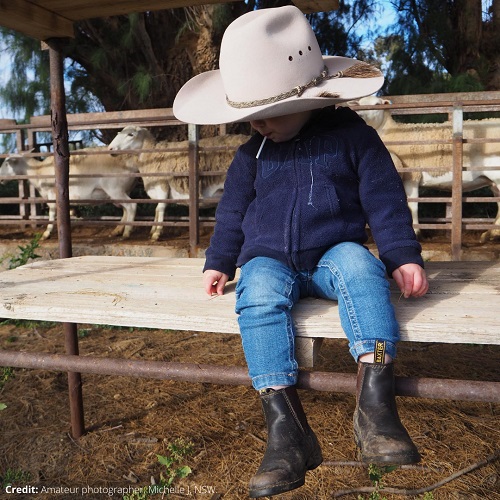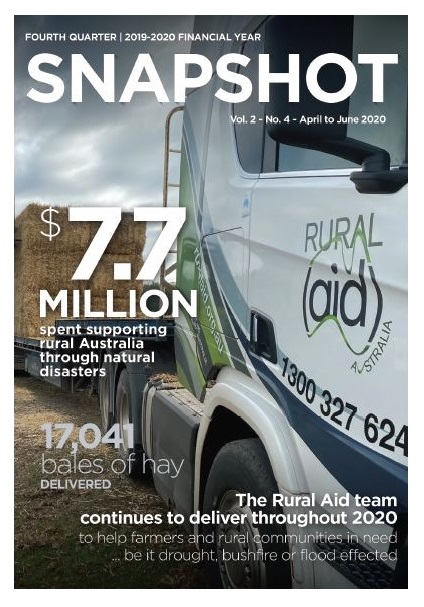Over $7.7 million in assistance provided in the three months of April to June 2020 comprises:
17,000 bales of hay, 2.66 million litres of drinking water and financial assistance delivered to drought, bushfire, flood and Covid-19 affected farmers.
Today, Rural Aid
released both its latest annual (2019/20) and most recent quarterly Snapshot
figures outlining the charity’s assistance provided to farmers and their rural
communities – www.ruraid.org.au/snapshots.
Rural
Aid CEO, John Warlters said delivering, on the ground, for farmers and rural
communities is more important than ever right now. While Rural Aid is well renowned
for delivering hay through our Buy a Bale campaign, we’ve also continued to
deliver drinking water, financial and counselling assistance to rural and
regional communities affected by drought, bushfire, flood and those impacted by
Covid-19.
“We could not support
our farmers and rural communities without the generosity of everyday Aussies
and our corporate sponsors,” John said. “As an independent, non-profit
organisation we don’t rely on government funding – it’s the continuing support
from individuals and corporate organisations that enables Rural Aid to assist farmers
and their communities through our various programs and initiatives.”
Covid-19
has certainly presented some challenges and our staff are as tenacious as the
farmers we support. I’m remarkably proud that we’ve continued to support those
in need without skipping a beat over the past year and, in particular the past three
months.
FIGURES
“In the past 12
months, since July 2019, Rural Aid has distributed over $31 million in
assistance to farmers and their communities. During these uncertain times, we’ve
continued to leverage our proven delivery model to ensure assistance reached
drought, fire, flood and now COVID-19 affected farmers.”
Fodder
and Water
“In
the last quarter alone – April to June 2020, Rural Aid delivered 17,041 large
bales of hay worth over $4.7 million into 286 locations to 1110 drought and
fire affected farmers on the back of 274 trucks. That equates to over 85
farmers per week receiving 1310 large bales of hay,” John said. “We also
delivered close to $62,000 worth of domestic drinking water to 140 farmers.”
“Each water truck
delivered, is on average, 19,000 litres, so that means around 2.66 million
litres or 2.66 mega litres of water was delivered to our farmers between April
and June 2020. That’s just over one Olympic size swimming pool full of domestic
drinking water being delivered to farmers.
Over
this same period, over $2.2 million in financial and pre-paid Visa card assistance
was distributed to 2,378 farmers, with many spending in their communities,
supporting local economies.
At
the same time, our littlest livestock farmers were also supported to the tune of
$85,000 with many beekeepers struggling as a result of bushfires each receiving
a $1500 bee support card to feed and sustain their beekeeping businesses.
John Warlters said organisational
planning around COVID-19 was undertaken to support Rural Aid’s direction as a
matter of course to ensure the charity continues to meet the needs of primary
producers and regional communities.
“We’ve seen a
greater need for services than ever before. COVID-19 restrictions has, of
course, impacted the way Rural Aid has had to deliver some of the programs and
initiatives to support our farmers and their communities but our focus has been
on getting prompt assistance to our farmers no matter the circumstance.
“Through digital
and workforce enablement initiatives our team has also found unique ways to
stay connected with rural communities. We’re conducting online webinars
including our weekly Community Builders Webinars Series, launched on 5 May
2020, to assist rural communities to be ready for when the rest of Australia
can visit them again and our monthly counsellors’ On the Couch Webinar Series,
launched on 11 June 2020.
Counselling
“During these
uncertain times, our counsellors have been kept busy supporting our farmers and
their families. They have been in regular phone contact and offering tele
counselling services. Again, with restrictions easing, some are now able to
visit at the farm gate. Our Rural Aid counsellors supported 1612 farmers and in
that same period, our counsellors conducted 330 counselling sessions over the
phone or using face-to-face web-based technology.
“Two of our
counsellors, Gary Bentley and Zoe Cox also have regular media participation,
with Gary’s fortnightly counselling column reaching 8 million readers across
Australia.
Community Support
“Our volunteers
have been sitting tight, but with restrictions easing in some states, some are
back on the road and will be helping our rural communities over the coming
months with two Queensland Our Towns (formerly known as 10 Towns) makeovers in
Gayndah from 26 July to 1 August and then onto Monto from 30 August to 5
September 2020.
“As of 1 July 2020,
the Gift of Music program was transitioned under the banner of
Community Support initiatives. During this time and because of restrictions
on children attending school, Rural Aid recognised the need for technology
support for rural and remote children.
Between April and
June 2020, under Community Support initiatives, we delivered 203 laptops,
valued at $200,000, to nine rural and remote schools, giving over 900 students
access to technology support.
If you are a
primary producer or farmer and require assistance, please register at: www.ruralaid.org.au.
Primary producers
and farmers must be registered with Rural Aid to receive assistance.
To help us to
continue to deliver this much needed aid to our farmers, their families and
their communities, please support Rural Aid by donating at: www.ruralaid.org.au/donate/
Links to media
release April to June 2020:
www.ruralaid.org.au/news/rural-aid-continues-to-support-farmers-and-communities-during-covid-through-digital-and-workforce-enablement-initiatives/
www.ruralaid.org.au/news/rural-aid-delivers-water-tanks-to-fire-impacted-cobargo/
www.ruralaid.org.au/news/rural-aid-launches-rural-community-builders-webinar-series/
www.ruralaid.org.au/news/fire-impacted-bega-farmers-receive-much-needed-hay-for-livestock/
www.ruralaid.org.au/news/rural-aid-partners-to-deliver-school-support-for-rural-children/
www.ruralaid.org.au/news/morgans-financial-donates-over-1-3m-to-rural-aid-for-gift-cards-for-farmers/
Media enquiries:
0447 116 757| media@admin.media.ruralaid.org.au
Media spokesperson:
Rural Aid CEO John Warlters – 0409 618 641
About Rural Aid
Rural
Aid is one of Australia’s largest rural charities. Well known for the highly
successful ‘Buy a Bale’ campaign, the charity also provides financial
assistance, water and counselling to farmers in times of drought, flood or
fire. Other initiatives support its vision that farming and rural communities
are safeguarded to ensure their sustainability both during and after these
natural disasters. Visit www.ruralaid.org.au
for further information on these programs and other support for our rural
communities.
Media: 0447 116 757 | media@admin.media.ruralaid.org.au
Spokesperson: Rural Aid CEO John Warlters | 0409 618 641
Follow Rural Aid for updates on:
Rural Aid – FB: @ruralaidaustralia | IG: @ruralaid |IN: Rural Aid Ltd | TW: @ruralaidaust
Buy A Bale – FB: @buyabaleofhay | IG: @buyabale | TW: @buyabale
DROUGHT OVERVIEW
NSW
According to the NSW
Department of Primary Industries seasonal update for June 2020, most of the
state – 86.9% – was in one of the three drought categories. Consistent rainfall
has allowed some central and southern areas to maintain strong potential for
drought recovery, while recent dryness in other areas such as the north east
has slowed recovery. In some situations, such as western NSW, the Drought Affected
category includes areas where little relief has been experienced and full-scale
drought response activities continue. Intense Drought conditions persist in
parts of western, south-east and northern NSW. There has been no relief and
these regions need effective rainfall to improve conditions.¹
Queensland
The Queensland
Government’s Long Paddock says, as at 1 May 2020 in Queensland, over 67% of the
land area of Queensland was drought declared.²
South Australia
The Primary Industries and Regions SA’s recent Crop and Pasture Report identified
the following drought affected areas within South Australia:
- eastern and western Eyre Peninsula
- upper North
- northern Yorke Peninsula
- Murray Mallee
- Eastern Mid-North (Eudunda to
Worlds End)
- North-east and north-west Pastoral
Current data identifies around 70% of the state and
more than 4500 farming properties as affected by drought. Map of drought-affected regions (PDF 940.4 KB)³
Bureau of Meteorology
Fires
The Bureau of
Meteorology noted in the Events section of its Annual Climate Statement 2019, published on
9 January 2020, that, ‘The extensive and long-lived fires appear to
be the largest in scale in the modern record in New South Wales, while the
total area burnt appears to be the largest in a single recorded fire season for
eastern Australia’.⁴
Rainfall
June (2020) rainfall
was the third lowest on record for Australia as a whole, and below average for
most of the country. Accumulated rainfall deficits at multi-year timescales are
significant in many parts of Australia and may persist for some time. Root-zone
soil moisture has decreased across most of South Australia and the eastern states
and remain below average for the southwestern half of Western Australia. Water
storage levels in the northern Murray-Darling Basin remain low; river levels
continued to decrease in June, returning to below average flow. However,
storages in the southern Murray-Darling Basin continue to fill and the Murray
River is receiving inflows from local and headwater catchments.⁴
2019
Warmest
year on record for Australia – mean temperature 1.52 °C above average
Warmest
year on record for New South Wales and Western Australia
Annual
total rainfall 40% below average with much of Australia affected by drought⁴
Parliament of Australia – 2019–20 Australian bushfires—frequently asked
questions: a quick guide⁵
A tweet by AFAC published on
28 February 2020 stated that over 17 million hectares had been burned across NSW, Victoria, Queensland, ACT,
Western Australia and South Australia.
The 2019-20
bushfires in New South Wales (NSW) have been unprecedented in their extent and
intensity. As of 28 January 2020, the fires in NSW had burnt 5.3 million
hectares (6.7% of the State), including 2.7 million hectares in national parks
(37% of the State’s national park estate). On 8 February 2020 the ACT Emergency Services Agency (ESA) stated that the Orroral Valley fire was approximately 86,562
hectares in size.
Various sources quoted an incident update from the
South Australian Country Fire Service (CFS) on 31 January 2020 which reported
that 210,606 hectares of land on Kangaroo Island (about 48 per cent of the Island) had been burned. The
South Australian Department for Environment and Water stated on 7 February 2020
that over 90,000 hectares of national park in South Australia had been
burned.
On 28 February 2020 the Victorian Country Fire
Authority declared that ‘all significant fires’ in Victoria had now been
contained, and noted that more than 1.5 million hectares of land had been burned.
¹Sourced from NSW
Department of Primary Industries and NSW DPI Drought Map
²Sourced from Queensland Government’s Long Paddock Drought Declarations
³Sourced from Primary
Industries and Regions SA
⁴Sourced from Bureau of Meteorology (BOM)
⁵Sourced from Parliament
of Australia Parliamentary Library




